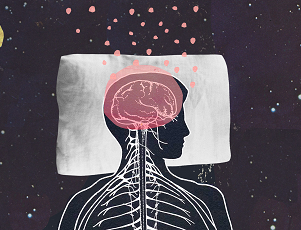
The glymphatic system is the analogue of the lymphatic system of the brain, with the ‘G’ in the front of the word standing for ‘glia’, or ‘glial cells’ that are part of it. Its aim is to remove any unnecessary remains of metabolic processes – a very important task, considering that these remains may prove harmful to the brain. It’s been observed that the glymphatic system is more active when we sleep. Dr hab. Marta Obara-Michlewska from the Mirosław Mossakowski Institute of Experimental and Clinical Medicine of the Polish Academy of Science discussed the subject during a lecture as part of the International Brain Awareness Week 2020.
Due to the immense degree of complexity and importance of the brain’s activities, its work is strictly and precisely regulated. Though it has a relatively low mass compared to the rest of our bodies, it uses as much as 20% of the energy produced by our organism. Such a high metabolic activity results in a lot of unnecessary by-products, which, if they accumulate, could poison this sophisticated and sensitive organ. But how does the brain rid itself of these by-products? The issue has been investigated by Prof. Maiken Nedergaard from the University of Rochester (USA), who in 2012, based on previous research, suggested that it is the glymphatic system that is responsible for detoxifying the brain.
One of the most important roles of the lymphatic system, made up of lymphatic nodes distributed all over our bodies, is to transfer unnecessary metabolic by-products from our tissues to venous blood, resulting in them being filtered out by the kidneys and excreted. The only place where there are no lymphatic nodes is the brain, though adjacent lymphatic vessels might by complemented by the glymphatic system. This issue, however, is still controversial and subject to research.
. . . during sleep, the glymphatic system is activated, detoxifying the brain from all unnecessary substances accumulated there throughout the day.
The glymphatic system works by transferring metabolic by-products such as proteins, ions or fats between the extracellular fluid and cerebrospinal fluid. The fluid, which is found in the subarachnoid space, ventricular system and spinal canal, is constantly reabsorbed by blood vessels, where it flows further, aided by the pulsing of these vessels and, to a lesser extent, the movement of pulmonary muscles.
It is believed that the cerebrospinal fluid enters the brain tissue near the arteries, replaces the used extracellular fluid, and then is transported out together with the metabolic by-products to the blood vessels and/or lymphatic vessels. According to latest research, the process of removal of these unwanted substances is facilitated by glial cells called astrocytes, which form a barrier between the brain and the blood vessels. A key role in this process is played by a protein called aquaporin (Aqp4), which is mostly present in astrocytes connected to blood vessels and is very efficient in transporting water.
Researchers from Prof. Nedergaard’s team have proven that transgenic mice which have been genetically altered to remove Aqp4 from their astrocytes suffer from glymphatic system disorders, caused by inadequate amount of cerebrospinal fluid and diminished extracellular fluid exchange. During their tests on mice, scientists have also discovered that the glymphatic system is more active during sleep due to increased volume of extracellular fluid. Additionally, inhibiting noradrenalin – which is thought to be responsible for the transition between being asleep and being awake – also increases the activity of the glymphatic system.
On the basis of this information, the researchers have formed a hypothesis on why sleep is so important for humans and other mammals. According to Prof. Nedergaard, the glymphatic system detoxifies our brains while we sleep, removing all substances that could potentially harm our brain. That is why a sufficient amount of sleep is crucial for normal functioning and development of the nervous system, and consequently, for our survival. Lack of sleep can cause mood swings, cognitive disorders, hallucinations, and in extreme cases, even death.
Original text: www.nauka.uj.edu.pl





